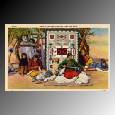
CHILDREN'S LITERATURE COURSE SYLLABUS


Text | Description |
"The stories we tell not only explain things to others, they explain them to ourselves". --Donald Norman--

Wednesdays 6-9PM (Jan. 17-April 4 w/optional snow day) (Jan. 17-March 21 w/o optional snowday) Office Hours by appointment on Wednesdays
Mailing Address: Box 3528 Farmington, NM 87499 Residence: Lake Valley, NM Phone Number: 505.786.7265 E-mail Address: abiyoyoyo@yahoo.com CIMTE 443 CHILDREN'S LITERATURE Class Collection Introduction to Libraries & Books Course EDU 238 CHILDREN'S LITERATURE Course EDU 238 CHILDREN'S LITERATURE Class Collection
Required Text: Savage, J. F. (2000). For the love of literature: Children and books in the elementary years. Boston: McGraw Hill.
Optional Text: Collins, R. & Cooper, P. (1997). The power of story: Teaching through storytelling. Boston: Allyn & Bacon.
Literature (reading, storying, and listening) is an important aspect of not only the school curriculum, but of life, in general. In this course we will focus on aspects of literature for children. The overall goals are understanding the human need for stories, and gaining such an appreciation and love of stories/literature that you will naturally want to share it in your personal, professional, and recreational life.
“When a day passes it is no longer there.
What remains of it? Nothing more than a story.
If stories weren’t told or books weren’t written, man would live
like beasts-only for a day.
Today, we live, but tomorrow today will be a story.
The whole world, all human life, is one long story”
(I.B. Singer in Cooper and Collins’ [1992] Look What Happened to Frog, p. 8).
COLLEGE OF EDUCATION GOALS FOR 2001
During the course techniques will be modeled, explained, and practiced. By the end of the course, you will: Appreciate the significance of story in human lives; Read a wide variety of children’s books suitable for elementary school children and young adults; Be able to read and tell stories to children in ways that captures their attention, imagination, and interests; Be familiar with a range of strategies for presenting literature selections to children; Be able to respond to literature in a variety of ways and encourage children to do the same; Be able to evaluate children’s literature with culturally sensitive perspectives; Be able to read, Read, READ children books of enjoyment to you; Be able to sample the vast array of children’s literature just waiting for you. Be expected to take an active interest in the work of others. Be invited to share the following: Academic integrity is expected of you and is to be reflected in your coursework. Refer to UNM Code of Conduct and Matters of Disciplinary Action in the UNM Course Catalog.
ATTENDANCE: Please plan to attend each session. It is understood that emergencies will arise that may require missing a session or part of a session. Please contact the instructor, when possible, if you have to miss a session or will be late for a session.
Please rearrange work and appointment schedules so that you can attend each session. Since our classes meet for longer over a shorter time period, there are NO excused absences. (Repeat, no excused absences.) Bonus work is required for each hour missed. Assignments will be given accordingly. One excused absence with bonus work completed results in one-letter grade reduction or additional assignments. Each unexcused absence results in a two-letter grade reduction (final grade). Two absences will result in a failing grade. Absences and lateness are considered serious interferences with your progress in this class.
PARTICIPATION: Please come to class prepared to participate in group and class discussions. Because we will be exploring responses to literature (oral and literary), developing ways of selecting, sharing, and discussing literature among ourselves and with young people, attendance and group participation are crucial. We will be building on our own reading ‘quests’ and reading adventures. It is hoped that you will build on your own reading adventures and discoveries, along with the course schedule and content.
The instructor reserves the right to drop any student who is excessively late or absent from classes and/or who is not keeping up with course assignments and projects.
A GRADE = completion of all course assignments and projects with a high level of academic excellence. B GRADE = completion of all course assignments and projects with an above average level of academic achievement. C GRADE = completion of all course assignments and projects with a satisfactory level of academic achievement. F GRADE = fails to show competency in course work and content. NO INCOMPLETE GRADES WILL BE GIVEN.















Text | Description |

